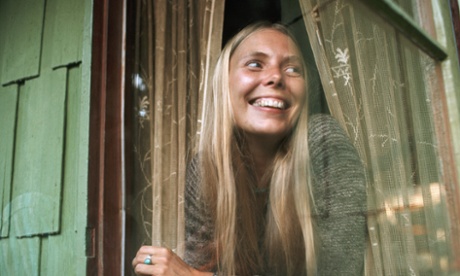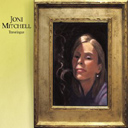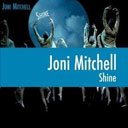The last time I was in Los Angeles, in February 2020, I had told a white lie. My taxi driver asked me what I was doing there. “I’m here to write about Joni Mitchell,” I said. I wanted to have a story. Earlier this month, I landed at LAX airport, returning to see Mitchell play at the Hollywood Bowl.
In 2020, the idea she would perform again seemed like fantasy. In 2015 she had an aneurysm that left her unable to speak or walk, and even before that, her public performances had been rare. But over the past few years, Mitchell has hosted musicians at her home for a “jam” in her living room. For a long time, she listened to others sing her songs to her, but then, gradually, she began to sing along. In 2022, she made a surprise appearance at the Newport folk festival in Rhode Island and, last year, headlined a show in Washington state. I failed to get tickets. In the days after, I’d watch videos of it people posted on Instagram, but with the sound down because it felt too painful to listen to, as though I was seeing the love of my life get married to someone else. I wanted to hold on to an idea I’d hear her for myself one day.
After my first trip to Los Angeles, I began to write a book, Arrangements in Blue, inspired by the type of intimate self-examination that is at the heart of Mitchell’s music, especially her album Blue. Like millions of her fans, I felt – I feel – that Blue belongs to me, as if it is part of my own personal mode of emotional expression. It shaped my ideas of romantic love, of the life I believed I would lead and the woman I would grow to be. So when I wanted to look at the life I’d created and the one I wanted, it was Blue I turned to, using a lyric from each of the songs as a prompt to explore different parts of life. Since my book was published last spring, I’ve become, for some people, tethered to Mitchell. I’m sent news about her, links to interviews and clips. Readers tell me what she means to them – what their favourite song is. And some tell me they’ve listened to her for the first time: they’ve found Blue because of my book. I’m hardly the first writer to fall under her spell, but I’m glad to have contributed to a growing body of culture that celebrates her significance as an artist.
Then, in January this year, she announced another show. I unfroze a credit card and bought – in a state of real panic and confusion, as though I was trying to escape the Crystal Maze – two tickets at the cost of £1,979.29. After, I was in shock. The combination of spending more money on a single thing than I’d ever done in my life and the near certainty I’d get to see Mitchell perform took hold of my nervous system in a way I couldn’t comprehend. How was I going to pay for all this and how would I survive the emotional debt this encounter with Mitchell might generate?
Once I land in LA, for the first few days I work in the courtyard of my hotel, my brain soothed by the sound of water running from the spout of a stonework lion into a small pond. Then I take a trip to the Getty museum. My Uber driver, a cheerful man named Gregory, asks me what I’m doing in LA. “I’m here to see Joni Mitchell at the Bowl,” I say. “I’m going to be writing about it for a newspaper back home.” “I’ve got chills!” he replies. “I’m so excited for you, you’re going to have the best time.” I can’t get my enthusiasm to match his. I realise I am feeling afraid.
My friend the Scottish poet Roddy Lumsden died just before my last trip to Los Angeles. He’d been ill for a long time, suffering from complications of alcohol addiction. That time is infused with grief: everything I saw and experienced was illuminated by or in the shadow of his absence and the confrontation his death had instigated. While I was standing outside Mitchell’s old house in Laurel Canyon on a kind of pilgrimage in 2020, for the first time I allowed myself to acknowledge a pain I’d been carrying. I had let the absence of romantic love become the organising principle of my life. I’d built my life around, and defined it through, lack. The trip was transformative: it opened up a space to rethink my life and ultimately it was the impetus to write Arrangements in Blue, which, while it isn’t a book about Mitchell, is a book that would not exist without her.
That I would tether my life so intimately to someone I’ve never met surprises me. I love to be a fan, but I’ve never signed up to fandom. I don’t get into fights about Mitchell on the internet and I am not a completist. There’s a lot of her oeuvre I’m yet to spend time with. But I have written a book inspired by a work of art created by a person who doesn’t know I exist. If that’s not fandom, then what is? The thought of sharing a space with her, the knowledge I would hear her speak and sing live gave me the woozy panicked feeling of waking from a dream where someone you’ve lost appears to be alive.
“The things we want most we will never have,” wrote Roddy in a poem. Will I get what I want? Do I deserve to have it? When it comes, will I be able to experience it, inhabit the moment completely? This was where the fear was coming from, that I might not be equal to the opportunity. Maybe Roddy meant not that you don’t get the things you want most, but that if you do, the experience will not correspond to the desire you felt. A bride left disenchanted by her longed-for wedding day.
Since my book came out I’ve been asked countless times: “Has Joni read it?” “I wish,” I say. “Oh God, I hope not,” I think. I hate the thought of my own art inspired by Mitchell finding its way to her and for her to hate it or, worse, be utterly indifferent. I don’t need her to know who I am, or what I think of her and how her music made me. A Mitchell lyric to hand for every heartbreak, for every sense of restlessness.
This is almost true. In the days leading up to the concert, I’ve daydreamed about what I might post about it on Instagram: a photo of Mitchell singing captioned: “This is my Eras tour.” There isn’t a Swiftie friendship bracelet exchange equivalent for the Mitchell fanbase, but I’ve brought my own merch. A customised jacket inspired by an original tour jacket from 1976. I commissioned someone to recreate the beautiful chain-stitched lettering on the back. At the show, I want people to say: “I love your jacket, where did you get it?” I want, I now realise with some small degree of shame, to identify myself as a big fan, attract Mitchell’s attention. My heart not just on my sleeve but embroidered on my back.
On my first trip to LA, I had a sense of wanting to trace Mitchell’s steps, as though being eye level with her experience might reveal something to me. I got more than I bargained for in that respect: it sent me careening into something more intimate than I could have imagined. But this time I have a strange sense of haunting myself, retracing my steps to check how I correspond with past me. LA keeps throwing cinematic narratives my way. Visiting a flea market, I stop at a box of old postcards and immediately find one, sent in 1934, with an ethereal illustration of the Hollywood Bowl at night. A couple of days later, I call an Uber and the driver gets out: it’s Gregory, from my trip to the Getty. He tells me that earlier that day he dropped a woman off in Laurel Canyon, saying she’d met Mitchell back in the day.
The day before the show, I meet up with photographer Dan Tuffs. We stop at the Canyon Country Store, a famous landmark from the 1960s and 70s, then take a detour so I can once more walk down Mitchell’s old street, site of my epiphany back in 2020.
The day of the concert, I have lunch with the writer Dolly Alderton (back in London, we met and became friends because we both love Mitchell). “How are you feeling?” We ask each other over our bloody marys. “I have a confusing sense of nervy excitement,” I say. “It’s like I am going to be doing a show.”
I go with my friend Doug Powell, a poet who lives in San Francisco. We meet before the show and walk to the Bowl, slowly meeting others going in the same direction, a snaking crowd forming. I tune into bits of conversation. “I hope she plays Morning Morgantown,” a man says. “I think she loves mozzarella sticks,” a girl says. “She loves mozzarella sticks?” her companion says in reply. “Yeah, well I think she’s definitely a vegetarian.” “Look at that jacket,” a woman says, and I wonder if she’s talking about me.
Taking our seats at the Bowl, I am surprised to find mine is slap bang in the middle: I will be eye to eye with Mitchell even if I can’t see her face from that distance. In the row behind us is a family, in front a lesbian couple; people with pizzas and drinks, wearing merch while holding on to their new merch.
The house lights go down and the stage begins to revolve. We all get to our feet. The big screen shows Mitchell on her throne, wearing purple velvet and her hair in plaits under a beret. Her skin seemingly lit from within, she holds a walking stick tipped with a diamond-encrusted cat’s head like a sceptre. Beside her, a table with a stained-glass Tiffany lamp. We are invited into her living room, all on the same level, seated, but spiritually at her feet.
She opens with two songs I don’t know, Be Cool and Harlem in Havana. It doesn’t matter. I almost need that dislocation from my personal Mitchell canon to adjust to what is happening: I am really there, she is really there. But the third song she plays is Hejira, the one I had dared to hope for. “So now I’m returning to myself,” she sings, “These things that you and I suppressed.” The tears come then, silent and steady. She sings Coyote, mischievous and sexy. I think of a young woman, Íde, who I met last year at a book event, and how happy she must be – I know she is somewhere in the audience – with her “No regrets Coyote” tattoo.
There is a singalong to Carey, reminding me of when I visited Matala in Crete, where Mitchell met Cary Raditz, and felt too self-conscious to sing along when the tour guide played the song on the coach. This time, I stand up with everyone else, add my voice to theirs. Closing her first set, she sings Both Sides Now; the moon rises to the right of the stage, inching over the hills as she begins and finishing high above the Bowl as she takes us into the interval. As counterpoint to her incredibly rich, strong voice, I can hear a woman behind me weeping uncontrollably.
The second half is more bombastic: out come the special guests (Doug leaps out of his seat at the sight of Annie Lennox). They begin with a barnstorming Big Yellow Taxi, a song I can ordinarily take or leave but find myself swept up by. A thrilling Raised on Robbery, followed by California, sung mainly by Marcus Mumford but redeemed for me by Joni’s spontaneous interjections. Hearing her ask an audience if they will “take me as I am” moves me deeply. The distance Mitchell has travelled between recording that song in her 20s and singing it to a rapt audience at 80 years old is so gorgeously felt in her voice. Every lyric and evolution of her register is enriched by the journey she has been on, and it feels a privilege to get to hear it: hear how life – its pain, glory, futility, rancour, joy – accumulates.
After Dog Eat Dog, someone shouts: “Fuck Donald Trump” and she replies: “I love that song.” Throughout, she chuckles and laughs, letting her pleasure show. During Shine, I scribble down a lyric – “They travelled inward / Past themselves” – because it feels important to remember. It’s where I need to go. To quote Come in from the Cold: “I longed to lose control.” I want to know I can just love Mitchell and (to quote an earlier song) “forget about me”.
I’m left wondering how you metabolise profound experience. I’m not sure you can in its immediate wake. That night with Mitchell was so intimately mine yet shared with almost 18,000 others. I was just a biggest fan among all her biggest fans. It has entered me in a form beyond language, infused my cells. I’m rendered daft and incapable other than the most cliched expression. If I feel overwhelmed, then good. I’m grateful. How wonderful to know what something has meant to you with no need to persuade someone of it.
On the postcard I found at the flea market, the sender wrote: “It was thrilling sitting there with just the stars for a roof.” Twice, when I looked up at the night sky above the Bowl, I saw a shooting star.
Arrangements in Blue by Amy Key is published by Vintage (£10.99). To support the Guardian and Observer order your copy at guardianbookshop.com. Delivery charges may apply









